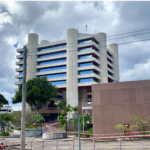In a boost for the struggling dairy industry, Pinnacle Feeds has extended its current purchasing agreement for another year, offering discounts to farmers grappling with rising costs and production shortfalls.
The move comes as milk producers seek further price reductions in upcoming negotiations.
After a year of steep production declines and high costs linked to hot weather, the farmers will welcome the breathing space to recover from a testing 2024 while they await an infusion of new cattle to boost production.
Rakeesh Bernard, managing director of Pinnacle parent company, Roberts Manufacturing, announced on Wednesday that the programme, which was to run for one year, will be extended for another 12 months.
Last February, the dairy and Pinnacle entered a purchase agreement to help take some of the financial strain off farmers. Back then, officials had forecast the industry should save as much as half a million dollars.
Bernard said he did not have the statistics to hand at the time and could not confirm if indeed the farmers saved $500 000 or more.
But, he said: “We are very excited to renew it. As long as they are willing to renew, we are willing to renew the programme. We have had an excellent relationship with the dairy farmers.”
For several years, due to various reasons such as heat stress, farmers have been struggling to meet their annual milk quotas. The industry went from a high of producing around 6 million kilogrammes of raw milk to a current low of 3 million to 4 million kilogrammes. This led to low supplies of milk on supermarket shelves on numerous occasions last year.
The purchasing agreement between the dairy and Pinnacle Feeds resulted in an 18 to 20 per cent discount.
While deeming the purchasing agreement a success, farmers said the cost of feed was ripping away at their monthly earnings by as much as 40 per cent.
Former president of the Barbados Dairy and Beef Association, Brian Allan said a further price reduction would be welcomed.
“It has been going as it was designed to operate,” Allan told Barbados TODAY. “We get the feed at a discounted price from Pinnacle and the money is automatically taken out of our milk cheques every month, which means that Pinnacle only has to deal with one person paying their bill on a monthly basis; they don’t have to worry about all the different farmers.
“It has been working well; we have been getting the price we have been promised, but sometimes we get problems. Around Christmas time, we had problems getting feed because of the manufacturing processes and so on but the actual programme is working. Up to this week, I got feed through the system.”
Allan said he would like another price dip so the cost of feed would only reflect 25 per cent, at most, of farmers’ monthly pay.
“Of course, we would like it to continue,” he added. “Since we entered into it, Pinnacle has dropped their prices to farmers across the board, not just dairy. I don’t know if our price can be lowered again. When it comes around to renegotiating again, I hope they can do something even better for us. The feed is still more expensive than it was a few years ago because of the international price for grain, and the international conflicts and so on. It’s still expensive. About 35 to 40 per cent of our milk cheques are in feed; it used to be 25 per cent. It is still too high for us.
“With the last shipment of imported heifers we had last year, they should get more volume. Once they go into milk production, more feed will be used so we are definitely hoping the programme continues and hoping that we can get a better price.”
Asked if there was a possibility for a further reduction, Pinnacle’s Bernard said: “I can’t speak to that right now, these things are volume-based and so when we sit back down we will have to look at that together and come to an arrangement.”
Last month, the industry imported 180 pregnant heifers from Canada at the cost of $2.6 million. It is expected that the cows will improve the genetics of the stock on the island while significantly improving milk production.
The importation has seen farmers benefiting from a rebate of $1.7 million, a hay programme and other incentive programmes such as a heifer rearing programme. Allan said the hay programme was working well but the rollout of the heifer rearing programme was taking too long. He called on the dairy association to press harder for it to come on stream.
sheriabrathwaite@barbadostoday.bb
The post Dairy farmers welcome feed discount extension amid production challenges appeared first on Barbados Today.


